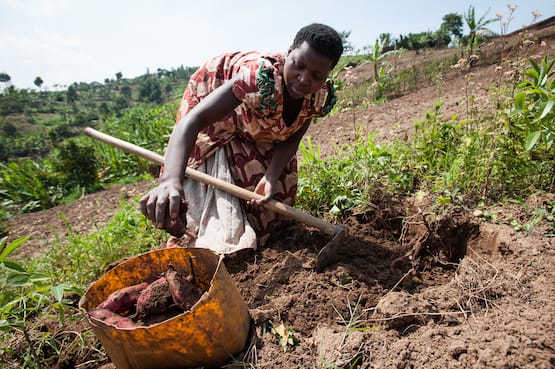The problem: subsistence-level farming with shockingly low yields
Agriculture is the dominant profession of the world’s poor: 80% of Africa’s poor are rural farm families, trapped in a state of subsistence-level farming. They face shockingly low yields, but lack the resources, training, or funds necessary to increase their farm’s productivity. [1]
In East Africa’s remote farming villages, basic technologies like seed and fertilizer are often unavailable — if they are available, farm families often cannot access the start-up capital necessary to purchase them. Smallholders also struggle to optimize their farming output without proper training on agricultural best practices. Finally, post-harvest challenges like inadequate storage, pest infestations, spoilage, and market fluctuations can prevent farmers from translating yields into profits.

The solution: holistically addressing the barriers to smallholder productivity
Traditional agricultural assistance programs often provide support in just one area — for example, offering a small start-up loan or subsidizing fertilizer. But distributing high-quality farm inputs yields little benefit if farmers cannot afford them or do not know how to properly use them. To truly improve farmers’ livelihoods, an organization must address all of these barriers simultaneously.
How One Acre Fund works
One Acre Fund’s model is designed to address all of the barriers to smallholder productivity. They deliver thousands of tons of high-quality farm inputs to within walking distance of every customer at the start of each planting season — and extend those inputs on credit at a quarter the size of the average microfinance loan. Throughout the season, One Acre Fund field staff deliver in-field training on best farming practices. And at harvest time, they provide farmers with the tools and knowledge to safely store their harvest and sell during the off-season for significant profit.
One Acre Fund’s success lies in coupling productive resources with comprehensive trainings and last-mile delivery, providing a complete value chain. On average, this model boosts clients’ incomes on supported activities by at least 40% within a single growing season. Furthermore, when farmers improve their harvests, they produce more food for their families and communities. By 2024, One Acre Fund estimates that participating farmers will produce enough surplus crops to feed themselves and an additional 14.4 million total individuals.
By 2024, One Acre Fund estimates that participating farmers will produce enough surplus crops to feed themselves and an additional 14.4 million total individuals.
One Acre Fund also operates a “Systems Change” platform through which it engages in partnerships with both private and public sector actors to improve the entire agricultural ecosystem. This work enables One Acre Fund to reach millions of additional farm families beyond its core program.
